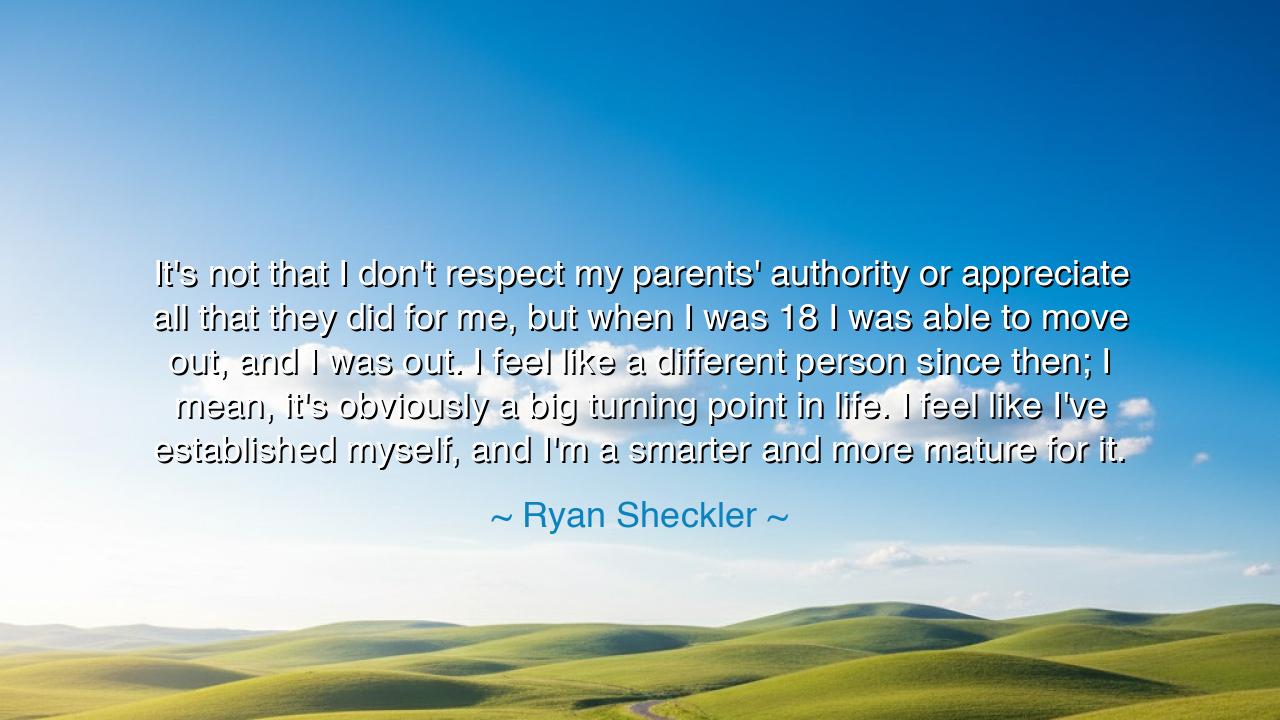
It's not that I don't respect my parents' authority or appreciate
It's not that I don't respect my parents' authority or appreciate all that they did for me, but when I was 18 I was able to move out, and I was out. I feel like a different person since then; I mean, it's obviously a big turning point in life. I feel like I've established myself, and I'm a smarter and more mature for it.






Hear, O children standing at the threshold of youth and adulthood, the words of Ryan Sheckler, who declared with candor: “It’s not that I don’t respect my parents’ authority or appreciate all that they did for me, but when I was 18 I was able to move out, and I was out. I feel like a different person since then; I mean, it’s obviously a big turning point in life. I feel like I’ve established myself, and I’m a smarter and more mature for it.” In these words is captured the timeless fire of independence, the awakening of the self that comes when one leaves the shelter of the household and begins to walk alone upon the road of life.
The meaning of his words is clear and eternal. He honors his parents, acknowledging their authority and sacrifice, yet proclaims that the moment of departure—his leaving at eighteen—was a sacred turning point. It was not an act of rebellion, but of transformation. For a young man or woman cannot remain forever in the house of their parents; there comes a season when wings must be spread, when the nest is left behind, and when the individual learns not from protection, but from struggle, risk, and responsibility.
Consider, my children, the tale of Alexander the Great, who as a youth was guided by his father Philip and taught by the great Aristotle. Yet when Philip was struck down, Alexander stepped forth as king at but twenty years of age. Though young, he became his own man, and through trials of leadership he matured swiftly. Without stepping beyond his father’s shadow, he could never have claimed his destiny. So too Sheckler declares: only by moving out, only by standing upon his own strength, did he truly establish himself and grow in wisdom.
The origin of this truth is written into the rhythm of all human life. Childhood is dependence; adulthood is independence. To leave home is not a rejection of parents, but the fulfillment of their labor. Parents raise their children not to cling forever, but to see them walk tall on their own path. Thus, when Sheckler speaks of becoming a different person after leaving, he speaks of the transformation that comes when guidance gives way to experience, when lessons are tested in the fires of reality.
Let us not mistake his words as arrogance. To claim maturity is not to scorn the past, but to honor it by living fully in the present. For true maturity is not gained merely by age, but by choice, by action, and by courage. Independence does not mean isolation—it means carrying within you the foundation of your upbringing, and building upon it with your own labor, your own victories, your own mistakes. This is how the child becomes the adult, the dependent becomes the established.
The lesson is radiant: if you are young, do not fear the moment of departure. Respect your parents, yes, and cherish their wisdom, but do not shrink from the path of independence. For in leaving, you will find not only freedom, but responsibility; not only risk, but growth. And if you are a parent, rejoice when your child takes that step, for it means your work has borne fruit. The leaving is not a loss, but a triumph.
Practical actions lie before you: embrace the trials that independence brings. Learn to manage your livelihood, your time, your choices. Do not run back to the shelter of childhood whenever hardship strikes, but face it with courage, and in facing, grow wiser. Seek mentors and companions, but let your decisions be your own. And always, even in your independence, hold gratitude in your heart for the parents and teachers who prepared you for this journey.
Thus, O heirs of tomorrow, let Sheckler’s words remind you: adulthood begins not when you are told you are ready, but when you step forth on your own. In that moment you become a different person—not because you have abandoned your past, but because you have embraced your future. Walk boldly, grow in wisdom, and let your independence be a song of gratitude to those who raised you, and a pledge of strength to those who will come after you.






AAdministratorAdministrator
Welcome, honored guests. Please leave a comment, we will respond soon